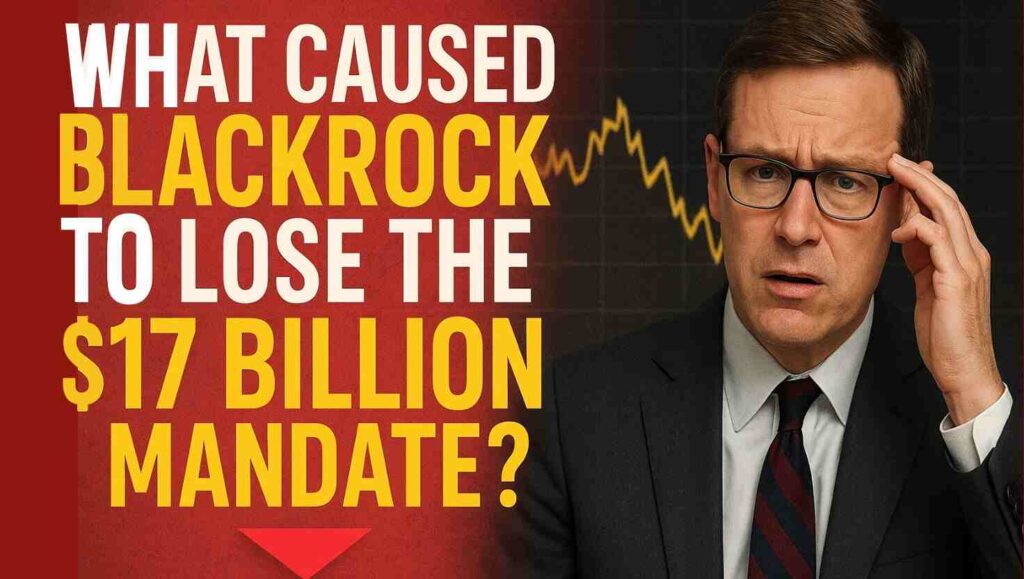What caused BlackRock to lose the $17 billion mandate?
What caused BlackRock to lose the $17 billion mandate: A large Dutch pension fund, PFZW, recently withdrew a significant $17 billion equity mandate from BlackRock, the world’s largest asset manager. This decision wasn’t based on poor financial performance, but rather a clash over Environmental, Social, and Governance (ESG) factors, specifically the firm’s perceived insufficient action on climate change.
This move is a strong signal that major institutional investors, particularly those in Europe, are becoming less tolerant of what they see as a lukewarm approach to sustainable investing. It highlights a growing divide between some U.S. financial firms and their European counterparts regarding the integration of ESG principles.
How did BlackRock get so much money?
BlackRock, the world’s largest asset management company, has built its massive wealth by managing money for governments, pension funds, corporations, and individual investors across the globe. Instead of making money like a traditional bank, BlackRock earns fees from the trillions of dollars it manages in stocks, bonds, real estate, and ETFs like the popular iShares funds. Its success comes from offering low-cost investment products, advanced risk management tools such as its Aladdin platform, and a reputation for stability and trust. Over the years, this combination of innovation, scale, and reliability has helped BlackRock attract huge inflows of capital, making it the financial giant it is today.
Go to Homepage
The Core Reason: A Clash over Climate Risk
The primary cause for the $17 billion withdrawal was the Dutch pension fund’s concern that BlackRock was not adequately addressing climate risk in its investment strategies. PFZW’s new investment strategy places an “equal emphasis on financial performance, risk, and sustainability,” and they felt BlackRock’s approach no longer aligned with this holistic view.
This decision comes at a time when BlackRock has faced immense pressure from two opposing sides:
- From the U.S.: BlackRock has been the target of an anti-ESG campaign led by conservative politicians, who have accused the firm of using “woke” policies to boycott fossil fuel companies. This pressure led BlackRock to exit a key climate-focused alliance, the Net Zero Asset Managers initiative, to avoid legal scrutiny and political backlash. This move was seen by many ESG advocates as a retreat from its climate commitments.
- From Europe: At the same time, European pension funds and regulators are pushing for greater climate action and accountability from their asset managers. They are concerned with the long-term, systemic risks that climate change poses to their portfolios. They’ve been a major force behind a push for transparency and tangible action on decarbonization.
BlackRock’s decision to withdraw from the Net Zero Asset Managers initiative, while perhaps intended to appease U.S. political interests, seems to have had a negative ripple effect, alienating some of its European clientele who are deeply committed to climate-conscious investing.

The “Fiduciary Duty” Debate
At the heart of this conflict is the concept of fiduciary duty, which requires asset managers to act in the ideal financial interest of their clients. For years, the traditional view was that this duty was solely about maximizing returns. However, the definition is evolving, with many, including PFZW, now arguing that failing to consider long-term risks like climate change is a violation of that duty.
Proponents of this expanded view of fiduciary duty argue that:
- Climate change and other ESG factors are material risks that can impact long-term financial performance.
- Ignoring these risks exposes a portfolio to potential losses from climate-related disasters, stranded assets, and new regulations.
- By actively managing these risks, asset managers are better protecting their clients’ investments over the long haul.
This perspective is gaining traction globally, particularly in Europe, where institutional investors are held to a higher standard of sustainability.
What This Means for the Investment World
The loss of this $17 billion mandate isn’t just a blow to BlackRock; it’s a powerful wake-up call for the entire financial industry. It signals several key trends:
- ESG is not a niche: The fact that a major pension fund would pull such a massive mandate over ESG concerns proves that sustainable investing isn’t a fleeting trend. It’s becoming a fundamental part of risk management and investment strategy for large, sophisticated investors.
- The U.S.-Europe divide is real: The U.S. and Europe are on different trajectories regarding ESG. While the U.S. faces political headwinds and a backlash against these policies, Europe is doubling down. This divergence could force global asset managers to adopt different strategies for different markets.
- Scrutiny on commitments: “Greenwashing”—or making unsubstantiated claims about environmental friendliness—is a major concern. Investors like PFZW are no longer satisfied with broad statements; they want to see concrete action and verifiable results from their asset managers.
- Opportunity for others: The $17 billion mandate was reallocated to a number of other firms, including Robeco, Man Numeric, Acadian, Lazard, and Schroders. This demonstrates that there is a strong demand for asset managers who can effectively integrate ESG into their strategies. For firms with a clear and demonstrable commitment to sustainability, this could be a significant opportunity to attract new capital.
In conclusion, BlackRock’s loss of the $17 billion mandate was a direct result of its struggle to navigate the complex and often contradictory demands of the global investment landscape. By prioritizing a new, holistic strategy that puts sustainability on equal footing with financial performance, the Dutch pension fund has set a clear precedent for what investors can, and will, demand from their asset managers in the years to come.
